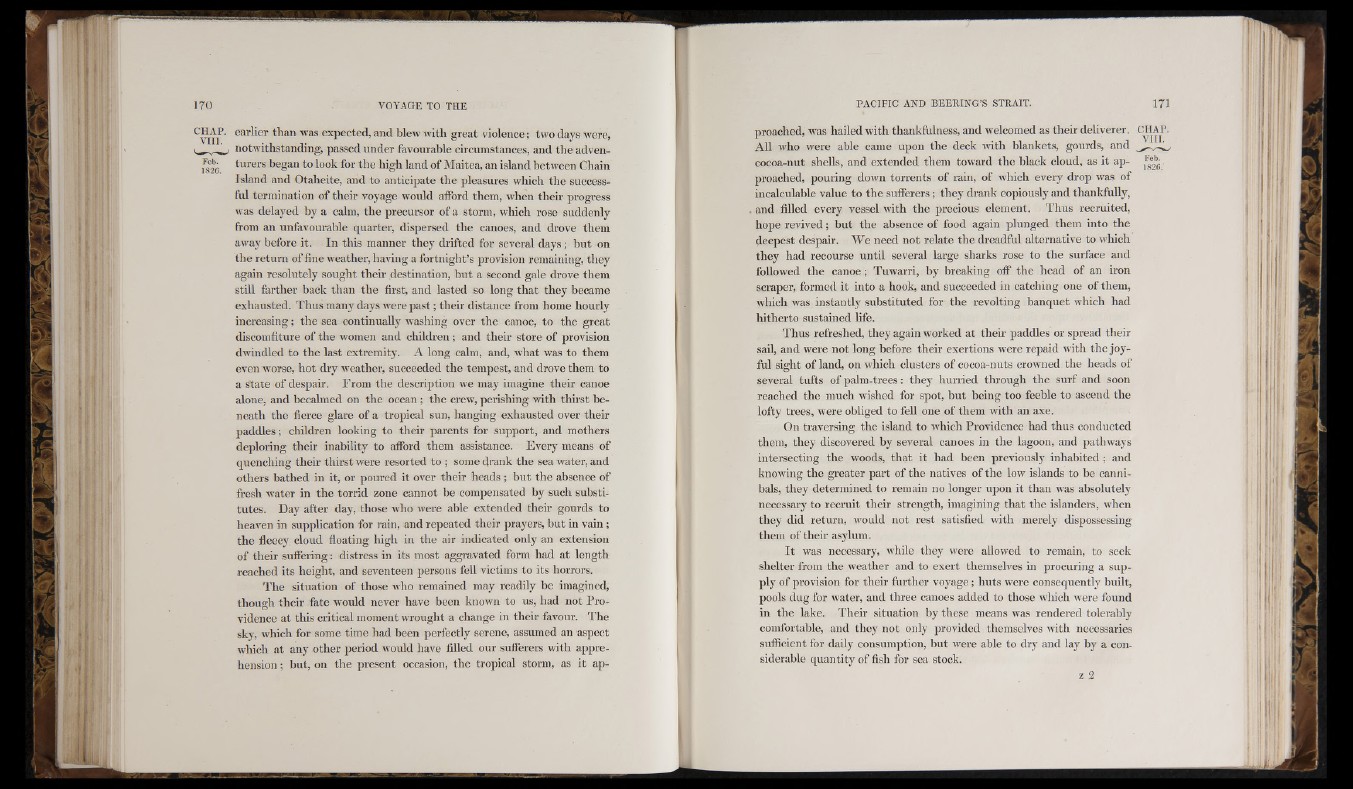
earlier than was expected, and blew with great violence; two days were,
notwithstanding, passed under favourable circumstances, and the adventurers
began to look for the high land of Maitea, an island between Chain
Island and Otaheite, and to anticipate the pleasures which the successful
termination of their voyage would afford them, when their progress
was delayed by a calm, the precursor of a storm, which rose suddenly
from an unfavourable quarter, dispersed the canoes, and drove them
away before it. In this manner they drifted for several days; but on
the return of fine weather, having a fortnight’s provision remaining, they
again resolutely sought their destination, but a second gale drove them
still farther back than the first, and lasted so long that they became
exhausted. Thus many days were past; their distance from home hourly
increasing; the sea continually washing over the canoe, to the great
discomfiture of the women and children ; and their store of provision
dwindled to the last extremity. A long calm, and, what was to them
even w’orse, hot dry weather, succeeded the tempest, and drove them to
a state of despair. From the description we may imagine their canoe
alone, and becalmed on the ocean; the crew, perishing with thirst beneath
the fierce glare of a tropical sun, hanging exhausted over their
paddles ; children looking to their parents for support, and mothers
deploring their inability to afford them assistance. Every means of
quenching their thirst were resorted to ; some drank the sea water, and
others bathed in it, or poured it over their heads ; but the absence of
fresh water in the torrid zone cannot be compensated by such substitutes.
Day after day, those who were able extended their gourds to
heaven in supplication for rain, and repeated their prayers, but in vain ;
the fleecy cloud floating high in the air indicated only an extension
of their suffering: distress in its most aggravated form had at length
reached its height, and seventeen persons fell victims to its horrors.
The situation of those who remained may readily be imagined,
though their fate would never have been known to us, had not Providence
at this critical moment wrought a change in their favour. The
sky, which for some time had been perfectly serene, assumed an aspect
which at any other period would have filled our sufferers with apprehension
; but, on the present occasion, the tropical storm, as it apFeb.
proached, was hailed with thankfidness, and welcomed as their deliverer. CHAP.
All who were able came upon the deck with blankets, gourds, and
cocoa-nut shells, and extended them toward the black cloud, as it approached,
1826.
pouring down torrents of rain, of which every drop was of
incalculable value to the sufferers; they drank copiously and thankfully,
and filled every vessel with the precious element. Thus recruited,
hope revived; but the absence of food again plunged them into the
deepest despair. We need not relate the dreadful alternative to which
they had recourse until several large sharks rose to the surface and
followed the canoe ; Tuwarri, by breaking off the head of an iron
scraper, formed it into a hook, and succeeded in catching one of them,
which was instantly substituted for the revolting banquet which had
hitherto sustained life.
Thus refreshed, they again worked at their paddles or spread their
sail, and were not long before their exertions were repaid with the joyful
sight of land, on which clusters of cocoa-nuts crowned the heads of
several tufts of palm-trees: they hurried through the surf and soon
reached the much wished for spot, but being too feeble to ascend the
lofty trees, were obliged to fell one of them with an axe.
On traversing the island to which Providence had thus conducted
them, they discovered by several canoes in the lagoon, and pathways
intersecting the woods, that it had been previously inhabited; and
knowing the greater part of the natives of the low islands to be cannibals,
they determined to remain no longer upon it than was absolutely
necessary to recruit their strength, imagining that the islanders, when
they did return, would not rest satisfied with merely dispossessing
them of their asylum.
It was necessary, while they were allowed to remain, to seek
shelter from the weather and to exert themselves in procuring a supply
of provision for their further voyage; huts were consequently built,
pools dug for water, and three canoes added to those which were found
in the lake. Their situation by these means was rendered tolerably
comfortable, and they not only provided themselves with necessaries
sufficient for daily consumption, but were able to dry and lay by a considerable
quantity of fish for sea stock. r: